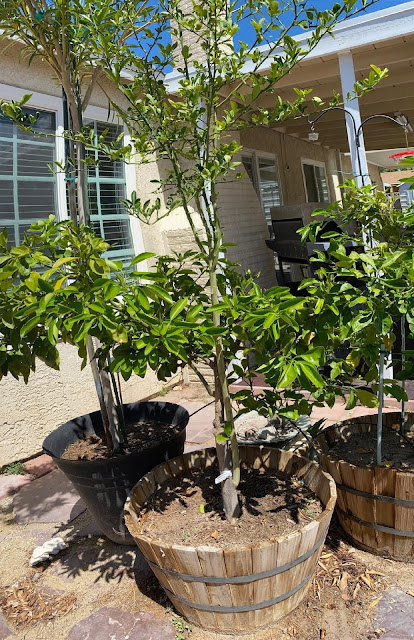Q.
Do you have any recommendations for pruning our poorly maintained ‘Navel’ orange
tree? The main trunk has grown to about
34” from the ground and leafed and branched out. Last season a “sucker” shoot sprouted from
the side of the truck and wasn’t pruned out.
Now it exceeds 8’ but seems extremely happy. 
Get rid of that sucker from the rootstock!
A.
That sucker is part of the rootstock and not part of the tree. You don’t want
it to stay. It should be removed when you first saw it. See how the leaves
growing on it are different looking from the Mother plant? Not only that, the
growth from it was so rapid the crotch makes a narrow letter “V”. It will not
support the weight of itself, plus its fruit, as the tree gets bigger.
 |
| Narrow crotches can support much weight. They make the letter "V" and good crotches make the letter "U". |
This type of branch will split from the
tree. Not only that, this unwanted growth “robs” the rest of the tree from
“food” that it makes as it gets larger and denser. What wasted growth! Remove
this sucker now and don’t leave a stub attached to the trunk when you do. It
should have been removed when it was first seen. Remember, if growth is a size
that hand pruners can remove, then do it anytime!
Early Freezing Weather Makes Fruit Drop Early
The most likely reason your fruit has fallen from the tree was because of early winter and spring freezes. The flowers froze, unpollinated, the fruit then died and fell off. This result can change from year to year depending on early spring freezing temperatures.
Citrus in General Not a Good Choice for Freezing Climates
Keep in mind this is a ‘Navel’
orange and not the best choice for our Las Vegas climate. A better choice would
be a ‘Satsuma’ orange (tangerine) because of our cold winters. The tree can
still lose fruit due to early spring freezing temperatures but at least you won’t
lose the whole tree! However, placement in the right microclimate for either orange
type, ‘Navel’ or ‘Satsuma’, may make a difference.
For ‘Navel’ orange place it in the warmer
microclimate of your landscape such as a south or west side. It needs
protection from winter cold to survive. The more cold tolerant ‘Satsuma’ would
be placed in a colder microclimate, such as the north or east side, of
the landscape. This placement delays the flowering of this tree as long as
possible. Your choice with which you want to keep but my vote is for changing
to a Satsuma.
No comments:
Post a Comment